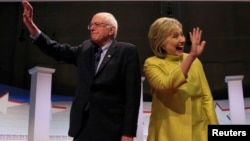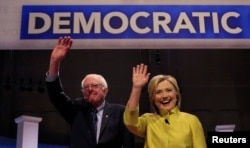The two Democratic U.S. presidential candidates, former secretary of state Hillary Clinton and Vermont Senator Bernie Sanders — the self-described democratic socialist — held another debate Thursday night in Milwaukee, Wisconsin as their race for the White House enters a new phase.
Clinton had picked up a major endorsement earlier Thursday from the political fundraising arm of the Congressional Black Caucus a group representing African-American members of Congress.
Black voters are expected to play a huge role in next week's South Carolina primary.
'Institutional racism'
During the debate, Clinton and Sanders both decried what they believe is institutional racism. Sanders called for a radical reform of what he says is a broken criminal justice system that includes over-policing of black communities, and far more black arrests for the same minor crimes also committed by whites.
But Clinton said changing sentencing laws must also come with more job opportunities and improved housing.
Sanders said economic distress in black and rural white communities is a result of trade pacts that he says moved manufacturing to China and threw millions of American workers onto the streets.
Both back President Barack Obama's executive action on immigration and say deporting hard-working immigrants is no answer.
Clinton said America Muslims are on the front lines in meeting the terrorist threat and that demagoguery aimed at Muslims is offensive and dangerous.
But Sanders was critical of rushing in with the goal of "regime change" in the Middle East saying he would look at the "unintended consequences" of leaving a political vacuum, pointing to U.S. support to getting rid of Moammar Gadhafi in Libya in 2011 and the situation in Libya today.
Role of government
Both candidates agreed that the American people are tired of establishment politics and an economy they say is rigged against working families.
But Clinton said the federal government would grow by 40 percent under a Sanders presidency and his proposed single-payer health care system. She said the country does not need another health care debate.
Sanders called it inaccurate that he wants to dismantle President Obama's Affordable Care Act, but said millions still have no insurance, and drug prices are still too high.
He said Americans would pay a bit more in taxes, but would save thousands in health care costs.
Challenges ahead
Clinton was touted for more than a year as the Democrats' top choice and almost certain to get the nomination.
But she barely beat Sanders in the Iowa caucus and lost the New Hampshire primary in a landslide.
Sanders has huge appeal among younger voters and can no longer be considered a so-called fringe candidate.
But it will be a challenge for him to keep up the momentum in the long campaign ahead.





